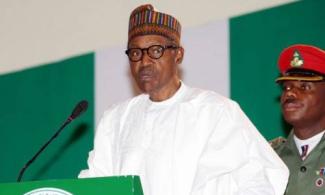
Organised Labour, therefore, stressed that the fuel shortages, price hike and avoidable long queues in filling stations are unacceptable and no longer tolerable.
The Nigerian Labour Congress (NLC) and the Trade Union Congress (TUC) have told the President Muhammadu Buhari-led government to find a lasting solution to the current fuel shortages and price hikes, stating that the situation is no longer bearable for Nigerians.
This was stated in a statement signed by The NLC and TUC presidents, Ayuba Wabba and Festus Osifo on Saturday in Abuja.
SaharaReporters earlier reported that petrol shortage had begun in Lagos State, and other major cities nationwide as long queues emerged in some filling stations.
Some filling stations, especially independent marketers, did not have the product to sell to motorists and other consumers, while those with commercial stocks increased their prices, ranging between N200 and N250 per litre, depending on location.
Organised Labour, therefore, stressed that the fuel shortages, price hike and avoidable long queues in filling stations are unacceptable and no longer tolerable.
They further described the situation as avoidable, unnecessary, crippling and pain-inducing fuel shortages and unapproved price hike of up to N240 per litre in the country.
They warned “no excuse is good enough to cripple the country. If there are challenges, they should be fixed. We have a government in power to fix challenges, not to make excuses.”
The statement said the labour leaders were bewildered and disturbed by the persistent shortage and uncontrollable prices that players in the downstream sector of the petroleum industry were meting out to Nigerians.
It noted that the persistent shortages of Premium Motor Spirit (PMS), otherwise called petrol, had become a source of pain to the Nigerian people.
It said this had led not just to long avoidable queues, but to adulteration of the product by unscrupulous elements, exploitation of the consumers and turning fuel stations to traffic menace.
“All these have tragic consequences for the Nigerian people and debilitating effects on the health of the economy which itself is not in good state.
“We are reliably informed that the shortage is deliberately fostered by players in the downstream sector in order to hike the price far above the government approved threshold.
“It is an added problem, when non-state actors begin to arrogate to themselves the power to determine the price of a litre of fuel far above the rate pegged by government in the current subsidy regime,” it said.
The labour leaders also said that the Nigerian people and the taxpayers currently spend trillions of naira annually to subsidise petrol.
They added that the same people could not be exploited and made to pay over N240 per litre when the current ex-depot price was N148.19k per litre.
Their statement noted that the opportunity cost of the subsidy payment was enormous and yet the benefits of the subsidy regime are gradually being eroded.
They argue that no country can develop if its people are subjected to constant hardship and its industries are shackled by unnecessary chains of misery.
“It is more disturbing that the government is equally demonstrating a high level of culpability in the unwholesome situation by its silence and unwillingness to frontally and publicly address the harrowing experiences in the current situation.
“No concerned and responsive government will bury its head in the sands like the proverbial Ostrich while the citizens are being brutally exploited.
“We are strongly worried that leaving our energy security and sovereignty in the hands of unscrupulous capitalists and their collaborators will further plunge this nation into the economic abyss we are working hard to avoid,” it said.
According to the statement, organised labour is ready and willing to engage the Federal Government and assist in any way possible in overcoming the country's current challenges.
It urged regulatory and law enforcement agencies to go further in protecting Nigerians from exploitation.